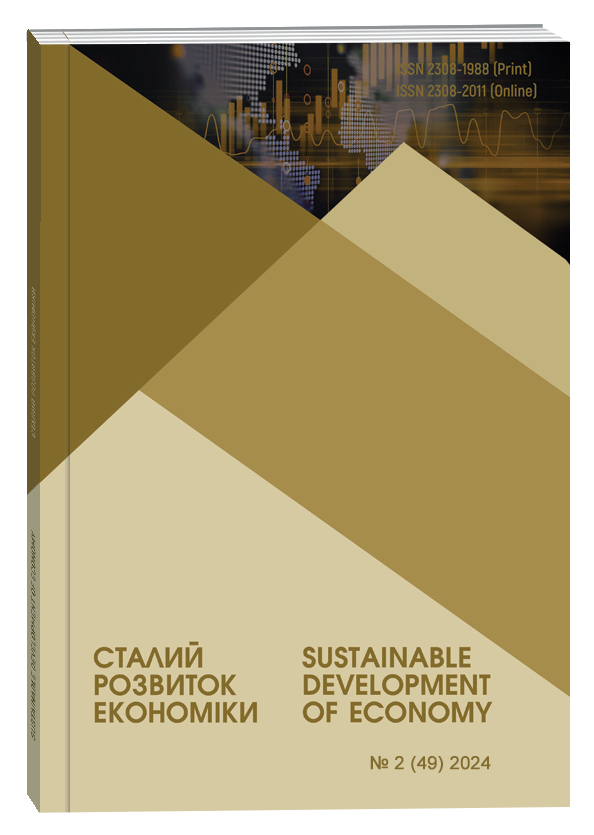SALES POLICY OF THE ENTERPRISE AND ITS ELEMENTS
Abstract
This article provides a comprehensive analysis of the company's sales policy, which is considered a key element in ensuring sustainable development and market competitiveness. The authors examine in detail the components of an effective sales strategy, including the selection of optimal distribution channels, logistics methods, distribution, and direct customer relations practices. Particular emphasis is placed on the importance of developing flexible sales strategies that allow you to adapt to changes in the market and meet the growing demands of consumers. Considering the theoretical aspect, the authors analyze scientific works describing various approaches to the sale and distribution of goods, highlighting the ideas of prominent economists and marketers. This makes it possible to compare traditional and modern views on sales policy, as well as to identify effective methods of sales promotion, including the use of marketing tools such as advertising, PR, merchandising, and others. In the practical part of the article, the authors provide specific examples of successful sales campaigns, demonstrating how theoretical concepts can be effectively implemented in business practice. They analyze cases that illustrate the use of innovative technologies in sales activities, including digital marketing and e-commerce, which is of particular relevance in the modern world. An important part of the analysis is the assessment of the impact of sales policy on the overall strategy of the enterprise. The authors highlight how a well-chosen sales strategy helps to strengthen the brand, increase customer loyalty, and create long-term relationships with customers. The article also discusses the relationship between sales policy and corporate culture, emphasizing the importance of internal synergy and team cohesion in achieving high sales results. In conclusion, the authors emphasize that sales policy is an integral part of the strategic management of an enterprise. They call for continuous analysis of the market situation, improvement of sales processes and an innovative approach to the development of sales channels, which should ultimately contribute to sales growth, cost optimization and increase the competitiveness of the enterprise.
References
Жовковська Т.Т. Маркетингові інструменти впливу на поведінку споживача (дослідження ринку підприємств харчової промисловості). Інноваційна економіка. Тернопіль, 2013. №10 (36). С. 195–198.
Ісаєв М.Ю. Класифікація підходів до визначення поняття «Збут». URL: https://repo.btu.kharkov.ua/bitstream/123456789/25014/1/Suchasnyi%20marketynh%20stratehichne%20upravlinnia%20ta%20innovatsiinyi%20rozvytok%2030.04.2020-36.pdf
Осокіна А.В., Снаговська Є.С. Сучасні підходи до побудови каналів збуту бізнес-організації. БізнесІнформ. URL: https://www.business-inform.net/export_pdf/business-inform-2018-11_0-pages-310_314.pdf
Слівінська В.В., Белова Т.Г. Дослідження каналів розподілу продукції підприємства. URL: https://dspace.nuft.edu.ua/server/api/core/bitstreams/60da0786-1f19-42f7-a692-256ec1231659/content
Шишкін В.О., Белоусова А.А. Підвищення ефективності системи управління каналами збуту виробничих підприємств. Волинський національний університет імені Лесі Українки. 2021. 126 с.
Нехай В.В., Колокольчикова І.В. Методологічні засади формування парадигми збуту. Вісник Хмельницького національного університету. Серія: економічні науки. Хмельницький. 2023. № 1. С. 120–125.
Багорка М., Абрамович І., Кравець О. Організація збутової політики в системі маркетингу аграрного підприємства. Підприємництво та інновації. 2024. № (30). С. 59–65.
Софієнко А.В., Шукліна В.В., Набока Р.М. Теоретичний маркетинг. Херсон: Книжкове видавництво ФОП Вишемирський. 2021.494 с.
Зозульов О.В., Царьова Т.О., Гавриш Ю.О. Маркетинг. Київ : КПІ ім. Ігоря Сікорського. 2022. 298 с.
Іванечко Н., Борисова Т., Процишин Ю. Маркетинг. Тернопіль : ЗУНУ. 2021. 180 с.
Zhovkovska T. T. (2013) Marketynhovi instrumenty vplyvu na povedinku spozhyvacha (doslidzhennia rynku pidpryiemstv kharchovoi promyslovosti) [Marketing tools for influencing consumer behavior (market research of food industry enterprises)]. Innovative economy. no. 10 (36). pp. 195–198. (in Ukrainian)
Isaiev M. Yu. Classification of approaches to the definition of "Sales". Available at: https://repo.btu.kharkov.ua/bitstream/123456789/25014/1/Suchasnyi%20marketynh%20stratehichne%20upravlinnia%20ta%20innovatsiinyi%20rozvytok%2030.04.2020-36.pdf (in Ukrainian)
Osokina A. V., Snahovska Ye. S. Modern approaches to building sales channels for a business organization. Available at: https://www.business-inform.net/export_pdf/business-inform-2018-11_0-pages-310_314.pdf (in Ukrainian)
Slivinska V. V., Belova T. H. Research of the company's distribution channels. Available at: https://dspace.nuft.edu.ua/server/api/core/bitstreams/60da0786-1f19-42f7-a692-256ec1231659/content (in Ukrainian)
Shyshkin V. O., Belousova A. A. (2021) Pidvyshchennia efektyvnosti systemy upravlinnia kanalamy zbutu vyrobnychykh pidpryiemstv. [Improving the efficiency of the sales channel management system of manufacturing enterprises.]. (in Ukrainian)
Nekhai V. V., Kolokolchykova I. V. (2023) Metodolohichni zasady formuvannia paradyhmy zbutu. [Methodological bases of formation of the sales paradigm]. Bulletin of Khmelnytsky National University. Series: economic sciences. no. 1. pp. 120–125. (in Ukrainian)
Bahorka M., Abramovych I., Kravets O. (2024) Orhanizatsiia zbutovoi polityky v systemi marketynhu ahrarnoho pidpryiemstva. [Organization of sales policy in the marketing system of an agricultural enterprise]. Entrepreneurship and innovation. no. 30. pp. 59–65. (in Ukrainian)
Sofiienko A. V., Shuklina V. V., Naboka R. M. (2021) Teoretychnyi marketynh. [Theoretical marketing]. (in Ukrainian)
Zozulov O. V., Tsarova T. O., Havrysh Yu. O. (2022) Marketynh. [Marketing]. (in Ukrainian)
Ivanechko N., Borysova T., Protsyshyn Yu. (2021) Marketynh. [Marketing]. (in Ukrainian)


